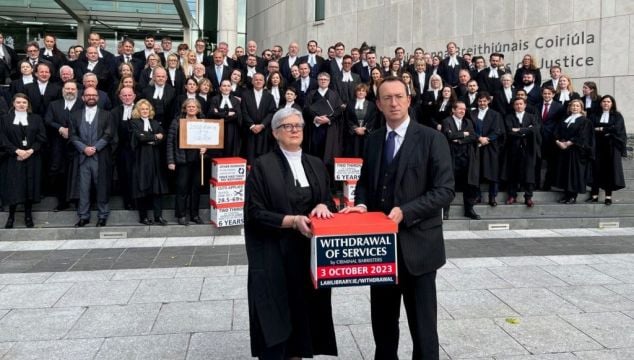Criminal law practitioners have protested outside courts across the country as part of a nationwide strike over fees.
It follows The Bar of Ireland’s recommendation of a one-day withdrawal of service for criminal law barristers.
Criminal barristers say their fees remain below 2002 levels in nominal terms, following a range of cuts applied during the financial crisis.
They say the 2008 government also unilaterally broke the link between fees paid to barristers with increases applied under public sector pay agreements in 2008.
Barristers say they have suffered a pay cut in real terms of more than 40 per cent over the past 20 years while every other group of workers in the criminal justice system has seen pay restoration implemented.
They say this is despite a range of additional reforms and changed practices being delivered by barristers.
The action, which is in pursuit of determining the fees payable to barristers by the Director of Public Prosecutions under the legal aid scheme, comes one week ahead of the Budget next Tuesday.
More than 100 barristers gathered outside the Criminal Courts of Justice in Dublin on Tuesday morning as part of the action.
Speaking to reporters there, chair of the Council of The Bar of Ireland Sara Phelan said there is “pent-up frustration” among members.
She added: “What brought us to this point is the failure of successive governments to actually reverse pay cuts that were applied during the austerity era, when the reversal of those pay cuts was actually recommended by the Department of Justice and the Office of the Director of Public Prosecutions in 2018.
“We’re expecting the minister and I suppose the various ministers and indeed the Government to take notice of the fact that we are here.
“There is a show of support for this action, barristers are very frustrated, and hopefully there will be progress in the budgetary process.”
Ms Phelan warned a “pipeline of young criminal practitioners” will leave the system if the issue is not resolved.
She said: “Our stats show that about two thirds of criminal practitioners leave the criminal bar after six years and if we don’t have that pipeline coming through, we won’t have an experienced skill set amongst criminal practitioners, both to prosecute serious crime, and therefore victims of crime won’t have their rights vindicated in a timely manner.
“Secondly, we won’t have experienced defence practitioners to defend those accused of serious crime who obviously stand innocent until proven otherwise.”
Chair of the Criminal State Bar Committee Sean Guerin said the DPP was unable to find senior counsel for serious cases on two occasions this year.
He said: “The unavailability of counsel with those skills and that experience is a threat to the integrity of the criminal justice system.”
Mr Guerin stressed the dispute was for barristers both defending and prosecuting crime.
He said: “At every level, engagement with the criminal justice system as a citizen requires a sufficient cohort of skilled and experienced practitioners to be available to act for people.”
Ms Phelan said she was hopeful that there will be a change for barristers in the budgetary process but said members would have to decide on “the next step” if that does not happen.
Asked about the impact on court proceedings, she said Tuesday, which is the first full day of the new legal year, was chosen to avoid disruption for the most number of people.







